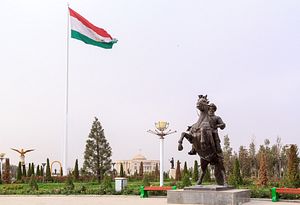Weekend Central Asia reading:
Tajik Opposition Under Threat: Members of Tajikistan’s former opposition, now labeled an extremist organization, who had been sentenced to long prison terms earlier this year, are under considerable threat behind bars, human rights activists say. As EurasiaNet reports, according to Ozadagon News 73-year old Kurbon Mannonov, a former IRPT regional head, died in prison this week. On August 11, Reporters Without Borders had warned that another man, Khikmatullo Sayfullozoda, the longtime editor of the IRPT’s Najot newspaper, was at serious risk behind bars:
Aged 66, he is still in a overcrowded center for provisional detainees, where he is being subjected to various forms of mistreatment including sleep deprivation. He has heart problems and pains in the legs, one of which is reportedly gangrenous.
According to the latest information, he nonetheless continues to be denied access to the treatment he needs. The IRPT reports that he has just begun a hunger strike.
Sayfullozoda was given a 16 year sentence in February. Unfortunately, the dozen or so IRPT leaders, convicted on extremism charges, are not eligible for the mass amnesty Tajik President Emomali Rahmon recently proposed to mark the country’s 25th independence anniversary on September 9.
Hashtags are Hard: Kazakhstan’s Prime Minister Karim Massimov returned to Twitter this summer after a four-year hiatus. A member of the Akhal-Tech Collective, writing for Global Voices in June was merciless: “Massimov’s recently re-invigorated Twitter deserves an honorable mention for the sheer brain-wrenching boredom of his tweets.” But boring tweets are the least of Massimov’s social media woes. As Farangis Najibullah detailed this week for RFE/RL, Massimov’s accounts recently issued a call to his followers to use the hashtags #25летНезависимости or #25KAZ to generate tweets about the country’s achievements since independence. As happens on Twitter, the hashtags were hijacked by disgruntled Kazakhs, frustrated by a host of issues. Najibullah gathered a good range of examples, though not all were negative: Kazinform, the national news agency, had plenty of nice things to say.
In other online Kazakhstan news, Bruce Pannier detailed this week that the Kazakh Information and Communications Ministry launched a new website where people can report websites and social media groups that “carry propaganda on suicides, narcotics, terrorism, extremism, acts of cruelty, interethnic strife, etc….” Pannier note “The idea of the new complaints page seems to have some merit,” but that it’s unclear what accountability measures or fail safes will be included. Submitting an online complaint could become the modern version of declaring your neighbor a kulak.
































